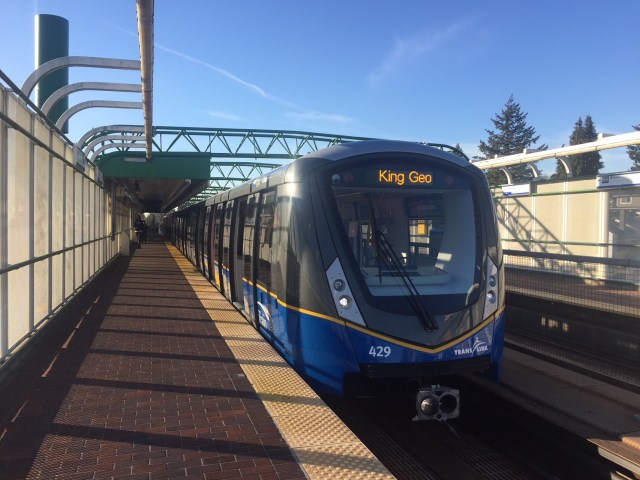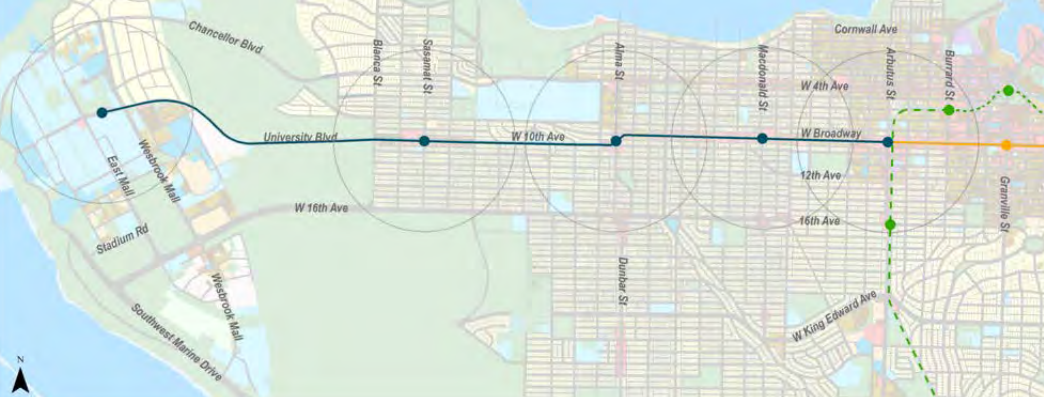A new staff report headed to the TransLink Mayors Council argues that SkyTrain is the best option for extending rapid transit to UBC.

According to the report, which looked at updated ridership forecasts and alternative light-rail options for linking to the university, only an extension of the SkyTrain line will be able to meet future demand.
Under the currently approved and funded Phase Two of TransLink’s 10-Year-Vision, the new Broadway Subway will only extend to Arbutus Street. That project is slated for completion in 2025.
“This work demonstrated that a SkyTrain extension to UBC is the only technology that would accommodate the forecast ridership on the Broadway corridor and allow for future expansion in the longer term (beyond 2045),” reads the report.
LISTEN: SkyTrain is the preferred transit method out to UBC
Other rapid transit options, such as a light-rail line from Science World to UBC would be at capacity within 15 years of being constructed, the report argues.
The report found that installing a pair of light-rail lines, one on Broadway and one on 41st Avenue, could meet future demand while actually raising ridership system-wide, but would require a much larger and costlier investment in infrastructure.
- Real Canadian Superstore fined for ‘misleading’ Product of Canada displays
- Danielle Smith promises Alberta referendum over immigration, Constitution changes
- ‘No reason to continue discussing’: Ontario mayor wants Andrew’s name dropped
- NDP leadership candidates pitch their rebuilding plans in final debate
According to the report, extending the line from Arbutus Street to UBC would cost between $3.3 billion and $3.8 billion.

Get breaking National news
The report is music to the ears of Vancouver Mayor Kennedy Stewart, who campaigned on extending the coming Broadway subway line all the way to UBC.
Stewart says pushing the line all the way to the university is a matter of creating a consistent, regional transit network.
WATCH: (Aired: Apr. 19, 2018) UBC offers to pay for some Broadway SkyTrain

“I think if we see it more as a regional project because actually, very little new bits are coming through Vancouver, then there’s going to be all kinds of people following along there,” he told CKNW’s Simi Sara.
“Once we pick the technology, then we can do the business cases and move the pitch to the provincial and federal governments.”
Stewart said he has been speaking with higher levels of government about contributing funding, along with the Musqueam First Nation and MST properties, which is looking to develop the Jericho lands.
UBC president Sanata Ono said the university is also prepared to contribute.
“Absolutely… We believe we need to have skin in the game. It could take a number of different forms — it could be providing land for stations, and we envision possibly two, one in the acclimate core of the campus and one in the growing Westbrook Village,” he said.
Ono said the university is also looking at funding through revenue generated by UBC services or through charges to developers.
“There are about 160,000 trips on a daily basis, and the population at UBC is over 80,000 individuals,” said Ono, arguing that demand for connection to the city will only grow.
The currently approved Phase Two subway plan, from VCC-Clark station to Arbutus Street, is expected to cost about $2.83 billion.
Last fall, the federal government locked in its $1.37-billion commitment to Vancouver and Surrey for rapid transit.
The B.C. government will contribute $1.82 billion, and TransLink, the City of Vancouver, and the City of Surrey will contribute $1.23 billion.
Stewart said he is meeting with Premier John Horgan on Tuesday to discuss the future of the SkyTrain line, and will meet with Prime Minister Justin Trudeau next week.
The TransLink Mayors Council will receive the report on Thursday.









Comments
Want to discuss? Please read our Commenting Policy first.